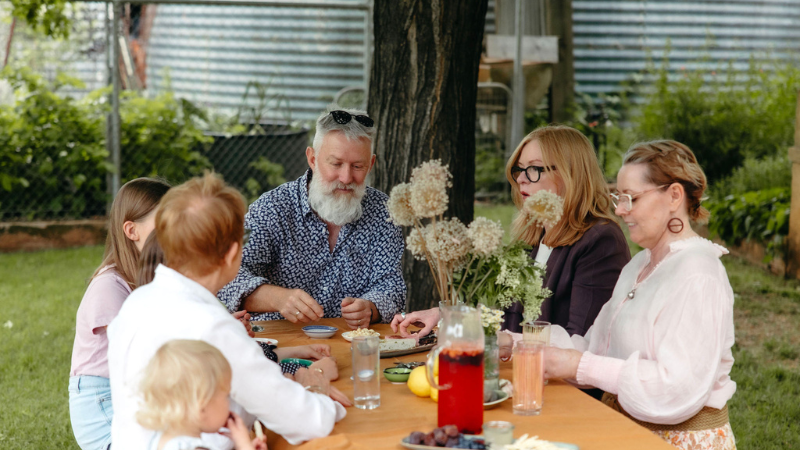Burnout Battle: Life in the Sandwich Generation

1.3 million Australians belong to the ‘Sandwich Generation’ and are at a higher risk of burnout.
The Sandwich Generation is a generation of people who care for their aging parents whilst simultaneously supporting their own children and juggling paid employment. I’ve been there. so I know how stressful this can be. I’ve come out the other side.
In 1981, Dorothy Miller and Elaine Brody coined the term ‘Sandwich Generation’, referring to the in-equality in the exchange of resources and support between the generations. At the time, it was referring to women in their 30s to 40s. The reality now is it is generally impacting people between the ages of 40 – 65.
The negative impact on mental, physical and emotional health is much higher for people juggling this complex role. The reality of experiencing burnout is common in this group which is why I am so passionate about education, empowerment and positive solutions for people during this time of their life.
Sandwich Generation, the unpaid carer
Did you know that currently in Australia there are 2.65 million unpaid carers, that is about 10% of our population. Of this group half belong to the ‘Sandwich Generation’.
An unpaid carer of an aging parent(s) has a very different experience to a paid carer. The emotional, financial, cultural and practical support needed is intricate at times and changes. There is no day off when you are an unpaid carer, and when you belong to the Sandwich Generation, you are often in the dilemma of not being able to utilize the resources and support available due to work constraints and the needs of your own children.
How did we get to this place and has this always been the case in past generations? By 2026 it is expected that 22% of Australians will be over the age of 65 compared to 16% in 2020. This increase obviously puts huge pressure on governments in providing appropriate and sustainable medical, aged care services and support for families.
The average age of parents in the 1980s was 28yrs and in 2022 it was 37 yrs. In the 1980s women who were often the unpaid carer also worked in paid employment 46-51% compared to 77% to their counterparts in 2022. The average life expectancy in 1980s was low to mid 70s compared to mid to late 80s in 2020 and to top it off, young people are staying in the family home well into their mid to late twenties which often means parents are involved in financially supporting their adult children and raising grandchildren.
- We are now living longer.
- Parents are having children later.
- Younger people are staying in the family home well into their 20s.
- Parents are often now looking after grandchildren
- Increase in women working outside the home
- Cost of living is higher
With all this data and analysis, there is certainly a shift in the reality of caring for our loved ones and the risk of not caring for ourselves. The most glaringly obvious shift is the age at which people are having to step up and support. The average age is now 40-60 which for women, is the peak perimenopausal and menopausal time of their reproductive life and for men it is the period of andropause. It is a time when hormones change and the probability of having a chronic disease increases. The addition of limited free time and ongoing stress creates a perfect storm for the Sandwich Generation resulting in a detrimental impact on health outcomes and increased chance of burnout. The other striking shift is the lack of time due to paid work, with fewer families having a stay at home parent. Women and men are often in their peak employment phase in their 40s to 60s and having the mental, emotional and practical ability to support their loved ones at this time is extremely difficult.
Why is the Sandwich Generation a higher risk for Burnout?
Now that we have established the reality that 5% of the Australian population between the ages of 40-60 are Sandwich Generators, let’s now talk about the risk and possibility of experiencing Burnout Out. And what you can do to avoid or minimize this impact.
In my blog Burnout – Is it a fad or is it real? I explain the symptoms and risk factors of burnout and highlight the real-life experiences of 65% of Australians today. Even though many people are exposed to unrelenting stress at times, the research indicates five commonalities of people with burnout. If you are living the Sandwich Generation experience, coupled with one or more of these risk factors below your chance of Burnout is much higher.
- The worker imbalance
- Toxic workplace
- Occupational Risk
- What you bring
- Personality & Behaviours
The worker imbalance is an obvious issue for people within the Sandwich Generation. This imbalance refers to having your paid work and the invisible work such as being a carer and other activities taking up too much time. Social connections in the workplace and being clear with your paid role and to have boundaries around this is important. When you are living the sandwich generation it is a time to look at all your commitments and let go of the ones that you do not need to do so you can use this time to take care of yourself.
Setting your workplace up for success and a place for calm sensory support, having the right balance of people connection and solo time to get your job done. Because of the added responsibilities and lack of downtime for people in the Sandwich Generation, talking to your boss or HR is the step in the right direction in finding an effective workplace that allows you to do your job. Post Covid-19 pandemic more employers are supportive of flexible workplace solutions.
There are seven occupations that increase your risk of experiencing burnout. Being a carer is one, which is not always a choice when you are living the sandwich generation experience. If you belong to one of the professions below it is important to understand that you require added support and to be mindful of clear boundaries around your work and to be creative in outsourcing jobs that you would normally do but are not realistic at this time.
- Educators
- Welfare worker
- Lawyers
- Law Reform
- Health Workers
- Senior Management
Being female, born between 1965-1979, single, divorced or widowed, tertiary educated or having an adverse childhood experience (ACE) are common threads among people who experience burnout. People in the Sandwich Generation also belong to this group, however if this is you, your chance of feeling the pressure is higher. Being kind and compassionate to yourself is the first step and seeking professional support in helping you navigate this stressful time of your life can make all the difference.
Specific personalities and behaviours are the final risk factors that can make your role as a Sandwich Generation more challenging. It is when you are unaware and not able to seek support that increases your risk of Burnout. In my clinical practice I have found softening and nurturing these personal traits and behaviours can be significant in making your Sandwich Generation and burnout experience less debilitating on you and the people that care for you.
Setting up for Success
Setting up for success is a term I like to use when times are tough and when you cannot see a solution. Success is a word that has many meanings and connotations that I feel has limited beliefs and outcomes associated. Too often I see people who compare themselves to others and judge themselves on how they should be doing better and coping better. I like to reframe this word when you are overwhelmed and drowning in the responsibility of caring for others and yourself. Success is being kind to yourself, changing the end goal to be realistic and learning to nurture your behaviours and personality gifts.
Are you connecting to some of these risk factors? Can you see how easily over months and years being in the Sandwich Generation you can end up feeling overwhelmed and unwell especially when you’re entering menopause and andropause? This is why I developed my Navigating Burnout program that takes you on a journey of empowerment and solution driven success. You can join the waitlist here.
Today, I have explored the awareness and understanding of some of the real facts and risk factors that occur to people in the Sandwich Generation. 1 in 20 people get to experience this reality at some point in their life, for some it is a short experience, for others it can last for many years. It is simply a part of life and will continue through the generations. What I hope for the 1.3 million Australians and our friends across the globe, is that this experience does not need to be endured with isolation, overwhelm, despair and chronic health issues.
I see you, I have been you, you are not alone and there are solutions.
Join the waitlist for Navigating Burnout
PS! If you are local to Dubbo we are also running a pilot study researching the use of nutritional and botanical supplementation for burnout. If you are feeling burnt out and are interested in participating please reach out to Sandra or Jacinta at sandra.grace@scu.edu.au or Jacinta.arellano@scu.edu.au


0 comments
Leave a comment
Please log in or register to post a comment